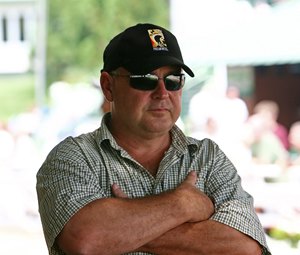NY Gaming Commission Details Rejection of Dutrow Appeal


New York regulators have issued a 16-page, formal order outlining precisely why they rejected former trainer Rick Dutrow's request for leniency to get his 10-year ban from the sport lifted.
The New York State Gaming Commission, in an order dated Aug. 8, said Dutrow had raised a number of "collateral issues" that were either irrelevant to the matter or should have been raised during a hearing into his case in 2011 had he shown "due diligence" at the time the state was looking into allegations against him.
In a 4-2 vote last month, the commission left intact its original 2011 order revoking Dutrow's license to participate in racing for at least 10 years. The panel at the time did not give specific reasons for the decision.
In 2011, Dutrow was slapped with the license revocation and $50,000 fine for a specific incident involving drug rule violations, as well as what the state regulatory agency at the time—then called the state Racing and Wagering Board—called a history of past abuses by Dutrow in the racing industry.
The new order said Dutrow was now attempting to bring up a "litany of reasons" why regulators should reopen the case to consider imposing a lighter sentence on him. Many of them, including testimony about how a 2010 search was conducted in a Dutrow barn at Aqueduct Racetrack and a new round of letters from supporters about Dutrow's character, were, in fact, considered by the original panel back in 2011 when it slapped him with the heavy set of sanctions.
Moreover, the order repeatedly states that Dutrow retains culpability.
"For the purposes of this application, Dutrow has effectively admitted the violations. Evidence that calls into question whether the violations were committed is not relevant to potential reconsideration of the penalties imposed, which is the relief Dutrow seeks in his application."
The order was released with the conclusions of four Gaming Commission board members: John Poklemba, Jerry Skurnik, Todd Snyder, and Barry Sample. Not included with the document—and it is uncertain one is available—was any dissenting opinion written by the two board members who voted this year to reconsider Dutrow's penalties: John Crotty and Peter Moschetti Jr.
Dutrow had his license revoked for at least 10 years after what regulators in 2011 called a series of rules infractions over the years. They did so after final infractions by Dutrow, which included the presence of the painkiller butorphanol in a urine sample from Fastus Cactus after a 2010 race at Aqueduct and the discovery of hypodermic needles in a desk drawer in a Dutrow barn.
Dutrow's lawyers attempted to bring what they called new evidence to the matter as a way to get the former trainer's penalties reduced. They raised questions about a Nov. 3, 2011, search of Dutrow's barn, with testimony by a New York Racing Association investigator saying that it was "highly unusual" that the search yielded evidence so quickly. The board noted that one investigator saw another investigator quickly locate the illegal syringes and did not witness that other investigator plant any evidence, the regulatory panel said in its new order.
Questions raised by Dutrow's application about who selected the barn for the search, and whether a further search was done after the syringes were found and stored in an investigator's car "are collateral issues to the penalty.'' The board presented other testimony from one of the investigators showing, at least to the board's perspective, that the official may have been confusing barn searches at Aqueduct over two separate dates.
Dutrow also sought to present evidence that a former assistant trainer he employed witnessed another NYRA investigator visiting a Dutrow barn unaccompanied for 40 minutes on Nov. 3, 2011. The board's order characterized Dutrow's concern as being that "NYRA officials were biased against Dutrow for criticizing other trainers.''
But the board said the former assistant trainer's testimony did not contradict any material facts, and there was no observation by the assistant that anything improper was done by the NYRA investigator when she visited Dutrow's barn. Another former assistant trainer of Dutrow acknowledged the box containing the syringes had been present for about one week, the board wrote.
The board, in its new order, said other original concerns raised by Dutrow, such as interference in the matter from the Association of Racing Commissioners International, had already been considered—and rejected—in 2011 by state regulators and by a subsequent appeals court that got the case and decided in favor of the state.
The board was equally unmoved by an online petition in support of Dutrow or a new round of character witnesses coming forth offering praise for Dutrow and stories of how well he treated horses in his care. The new order notes that regulators in 2011 acknowledged Dutrow took "tremendous" care of his horses. It quickly added that the hearing officer who handled the 2011 case concluded "that his numerous past equine drug violations showed he would continue to commit such violations and recommended that Dutrow never again be issued a trainer license in New York.'' The full board in 2011 amended the penalty to license revocation with a chance he could reapply for a license after 10 years.
"We see no reason to exercise our discretion to reconsider the initial imposition of penalties that our predecessor agency duly determined and that have been considered and affirmed through full and fair litigation in the courts of New York,'' the majority of the Gaming Commission's board wrote this week.
A lawyer for Dutrow did not immediately respond to an email seeking comment on the newly released Gaming Commission written order.
